Clara Alisch
Clara Alisch lives and works as a visual artist in Bremen. She graduated in 2021 as Master of Fine Arts from the University of Fine Arts Hamburg in the field of time-based media, where she was supervised by Matt Mullican and Michaela Melián. In 2018 she spent a semester studying at the École Nationale Supérieure des Beaux-Arts de Paris as part of the Art School Alliance scholarship programme.
Alisch’s work and research focus on intersections of artistic, political, and academic discourses on (in) visibility relations, feminist spatial practices, and collective action strategies. She looks primarily at unpaid and therefore invisible reproductive work, in this context exploring utopian and speculative potentials for alternative (socio-)cultural narratives. Her artistic practice includes immersive multimedia video installations, performances and artifacts that strive to make these issues visible.
Her works have been shown at the Medizin-Historisches Museum Hamburg (2018), Fleetstreet Theater Hamburg (2018), Diözesanmuseum Rottenburg (2022), Hamburger Bahnhof - Museum für Gegenwart Berlin (2022), and Kunsthalle Wilhelmshaven (2023), among others, as well as in various solo and group exhibitions in Germany. She was also nominated for the 47th Bremer Förderpreis of the Städtische Galerie Bremen in 2023.
https://www.instagram.com/clara_alisch/
Clara Alisch is PhD candidate in the Binational Artistic Phd Program at HfK Bremen (University of the Arts Bremen) in cooperation with ZHdK Zurich (Zurich University of the Arts). Supervisors: Prof. Dr. Andrea Sick (HfK-Bremen), Prof. Dr. Sigrid Adorf (ZHdK-Zurich).
RESUME
EDUCATION
2021-2024 Master's studies in Art History and Film Studies at the University of Bremen
2018-2021 Studies in Fine Arts with a focus on Time-based Media at the Hamburg University of Fine Arts supervised by Prof. Michaela Melián and Prof. Dr. Hanne Loreck, Master of Fine Arts
2017-2018 École Nationale Supérieure des Beaux-Arts de Paris supervised by Prof. Marie-José Burki
2014-2018 Studies in Fine Arts with a focus on Time-based Media at the Hamburg University of Fine Arts supervised by Prof. Matt Mullican and Prof. Michaela Melián, Bachelor of Fine Arts
2007-2017 Training and work as an intensive care nurse
SCHOLARSHIPS AND AWARDS
2023 Nomination for the 47. Bremer Förderpreis of the City of Bremen, Städtische Galerie Bremen
Art Residency „The Art of Emergency“ 2023/2, THEALIT. Frauen.Kultur. Labor. Bremen
Nomination for the NORDWESTKUNST Prize, Kunsthalle Wilhelmshaven
2022 Winner of Art Award #rundgang50hertz, Hamburger Bahnhof Museum für Gegenwart Berlin
Ursula-Schneider Prize, 1st Main Prize, Museum der Arbeit Hamburg
VULNERABLE, Art Award, 2nd Main Prize, Diözesan Museum Rottenburg
NEUSTART KULTUR, #TAKEHEART Residency Support, FONDS für Darstellende Künste Berlin
Individual Grant from the Senators für Kultur Bremen, Project Funding
2021 Behörde für Wissenschaft, Forschung und der Bezirke Hamburg, Project Funding
Kunst trotz(t) Corona HFBK Hamburg, Project Funding
Individual Grant from the Senators für Kultur Bremen, Project Funding
2018 Fleetstreet Hamburg, Residency Program
Hamburgische Kulturstiftung, Project Funding
Rudolf AugsteinStiftung Hamburg, Project Funding
2017 Cusanuswerk Bonn Scholarship, Artist Support
Freundeskreis der HFBK Hamburg, Project Funding
Toepfer Stiftung F. V. S., Art School Alliance Scholarship
DAAD Travel Scholarship
2016 Behörde für Kultur und Medien Hamburg, Emerging Artist Support in Performance
2004 History Competition of the Federal President by the Körber Stiftung, Promotion Award
SOLO EXHIBITIONS (SELECTION)
2023 "Support Structures", Gallery of the Künstler*innenhaus FRISE e.V., Hamburg
"Performing Care", THEALIT. Frauen.Kultur. Labor. Bremen
2021 "Becoming Many", Mikropol Hamburg
"Lactoland", Graduate Show (MFA) HFBK Hamburg
2019 "Incomings", Galerie Asterisk (a feminist intervention), Online Gallery
2018 "The Voice of Shannon", Fleetstreet Theater, Hamburg
"(De)Synchronizing", Raum Links Rechts – Gallery for Young Art, Hamburg
„Technobody", Medizinhistorisches Museum, Hamburg
"More", Graduate Show (BFA) HFBK Hamburg
2017 "Individual Optimization Society", hinterconti, Hamburg
"Shiny But Cruel", 2025 Art and Culture e.V., Hamburg
2016 "Split Screen", Folgendes Raum, HFBK Hamburg
EXHIBITIONS (SELECTION)
2024 "For International Women's Day: Happy Birthday to me", NYT.ART.SPACE Berlin
"Ausstellung zum 47. Bremer Förderpreis", Städtische Galerie Bremen
2023 "Mutter", Gruppe Motto Galerie Hamburg
"Alabaster_und von Horizonten", Screening, Raum PRO Bremen
"Kunst-Imbiss, Ambulante Kunstversorgung", Reeperbahn Festival Hamburg
"Imagine Transparency - (Un)sichtbarkeiten in der Kunst", Jupiter Hamburg
"Mutter? Eine Spurensuche", Kulturkirche Bremerhaven
"Klassentreffen – Sound and Performance Festival", HFBK Hamburg
"Sehnsucht", 2nd Hochkantfilmfest, Bremen
"NORDWESTKUNST", Kunsthalle Wilhelmshaven
"Motherhood", Syker Vorwerk – Zentrum für Zeitgenössische Kunst Syke
2022 "RUNDGANG 50Hertz", Hamburger Bahnhof – Museum für Gegenwart Berlin
"Work on the Spot", hinterconti Hamburg
"Vulnerable", Kulturkirche St. Maria Stuttgart
"Aktion ARTIST CAKES & CRÉMANT CARE", Künstler*innenhaus FRISE e.V. Hamburg
"Pfeil Release Issue Fifteen", Montez Press, London – New York – Hamburg
2021 "LESS TIME LESS MONEY", Kunstverein in Hamburg
PORTFOLIO
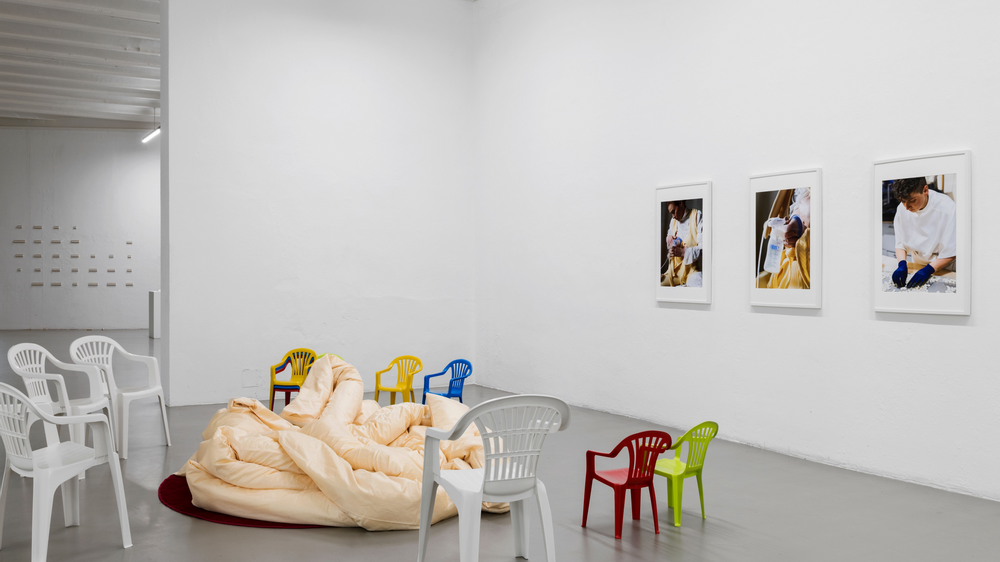

Multidimensional intervention: Milkworkers 1–3, 2023, photographs, each 91x61 cm, Milky Spot - light yellow nursing cushions filled with EPS beads on a red round carpet (diameter 200 cm), For Use - white monoblock chairs and colourful children‘s monoblock chairs for use
Photo: Jens Weyers
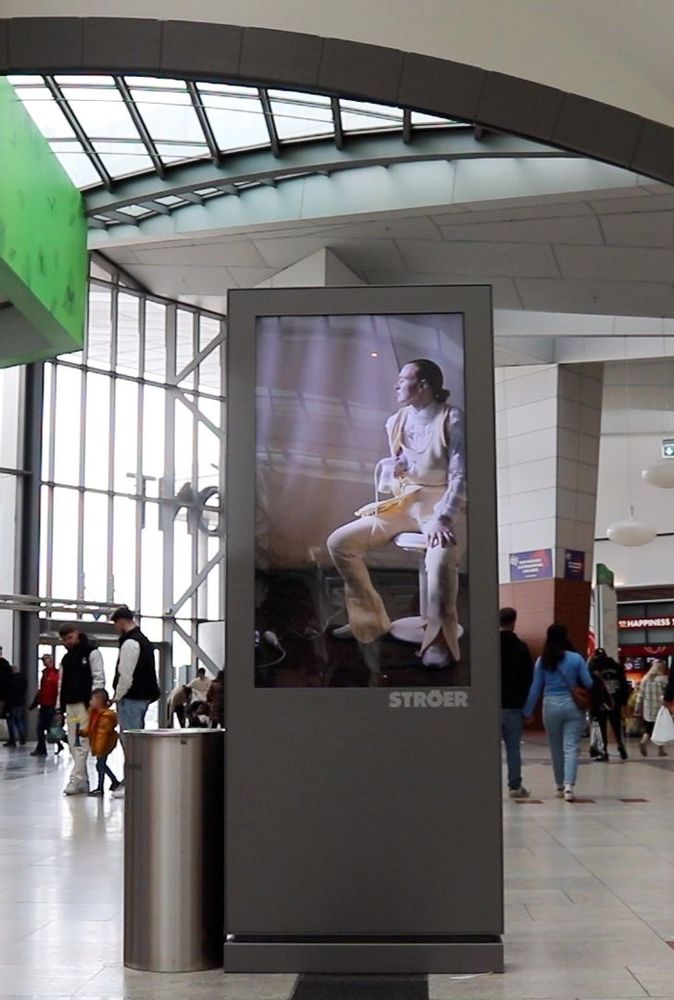
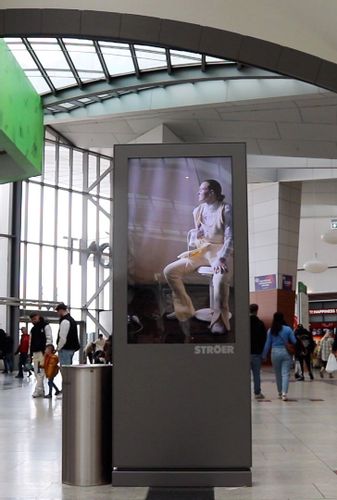
2nd Hochkantfilmfest Bremen “Sehnsucht”, Waterfront Bremen, exhibition view.
The Reproductive work, which is often performed by women* in the home, remains invisible in the capitalist system with its equation of work and wages. The historical division between the private space as a place of reproduction and the public space as a place of production leads to the isolation of reproductive workers. Lactoland shows a protagonist - the milkworker - gazing longingly out of the window into the sun. Many people still perceive the sight of breastfeeding in public as an imposition. Clara Alisch wants to challenge our viewing habits in order to counteract the marginalization of care work.


Videostill, multimedia installation.
https://www.butenunbinnen.de/videos/clara-alisch-kunstwissenschaftlerin-bonbons-muttermilch-100.html
A woman* sits on an ergonomic chair. She is wearing work clothes and is looking out of the window. She administers a breast pump to her bare breast with a routine motion. The place is reminiscent of a production hall. Sun is shining through the windows. The noise from the pump fills the room. A tinge of yellow. It all starts with a drop. Another drop. Each drop counts. A milk producer at work.
Lactoland is a performance of the process which revaluates milk by means of a video show. The historic evolution of women’s milk as an economic substance to what is known as breast milk is being reversed. Viewers can take part instantaneously and interpassively in the procedures of manufacturing Lactoland’s product. Lactoland impressively demonstrates the efforts involved in manufacturing the product. The process of manufacturing comprises the act of pumping milk, the spatial isolation involved as well as the sound and the production of candy from the milk that is pumped. Lactoland aims to create visibility and audibility for feminised reproduction work which tends to be hidden from view in our daily lives, usually in allocated rooms like parent-children rooms, sanitary facilities or at home. The technology of the breast pump promises to be time saving but the mother is effectively becoming the child’s wet nurse which means she is doing the double amount of work. Paid labour, care work and free time are merging into one. This is how many mothers perceive their situation. In order to create visibility for the act of breast-feeding, which is by its nature a temporary act, Lactoland is demonstrating it in a sustainable way, thus searching for means to solve the dilemma of femininity vs. independence. The processes of feminist and artistic production as well as the assumption of naturalised subject positions invite us to question the relationship of parenthood and work by means of visualisation and verbalisation. Daily acts of care taking by way of breast-feeding are at the heart of Lactoland. This art project aims to present a way of changing perspectives in order to allow us to turn invisible care work into something visible. This should lead to the formation of new relationship patterns, as well as counteracting the marginalisation and isolation of care work. The drop of milk with its digital-abject dynamic appears before our eyes and thereby enters the public sphere. Is there a better way to come into contact with human milk, other than by being a parent, child or care worker?
Lactoland is an overall installation consisting of a work of video and sound of approx. 11 minutes, which is being presented alongside a jar of candy filled with the product manufactured exclusively for Lactoland as well as a movable screen. Recipients can watch it behind the screen while sitting on stools provided for this purpose. Lactoland can also be experienced as an audio-visual presentation using a screen or projector. Visibility and audibility of the artistic material are the most prominent means of perception here, in order to document the focus on “reproduction work as work”. Transition is achieved by the possibility of a participation – tasting the candy produced by Lactoland allows for experiencing in a sensual way how the boundaries between work and social inequality with respect to the female body are blurring.
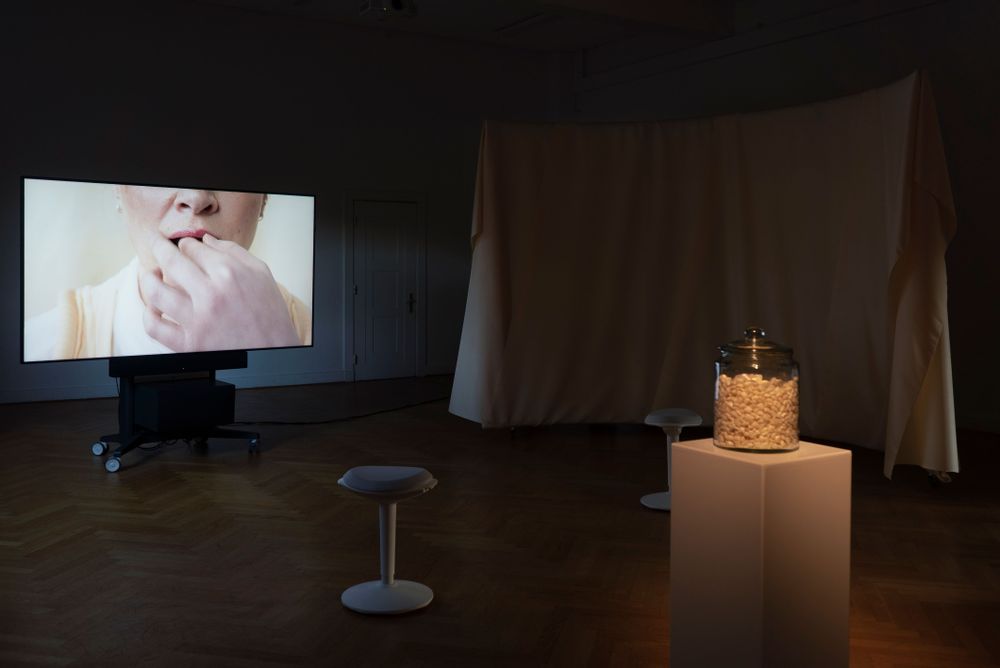

Multimedia installation, installation view, HFBK Hamburg.
Photo: Janis Fisch
In her video installation Lactoland (2022), Clara Alisch addresses the romanticised notion linked with breastfeeding and the associated image of the mother. It’s about care work, which is traditionally done by women in the domestic sphere and is neither remunerated nor recognised by society. The cyborg—a hybrid being made up of human and machine—is brought into play here. It becomes the protagonist of a setting designed by Alisch in which it makes milk available by expressing it. By using numerous prosthesis-like utensils, the milk is made into bonbons. accompanies the ideal of the mother’s breast and the breastfed baby—into a tale of work that adds value. This comes closer to the new ideal of a transgender world: “machine and organism” and “social reality” and “fiction” are hybridised as a feminist protagonist.
(Melanie Franke, Hamburger Bahnhof - Museum für Gegenwart Berlin)
https://projekte.hfbk.net/project/31035d4a-9e6b-46b6-a6dc-640f5de1a605
directed, written and produced by Clara Alisch
Milkworker 1: A Friend
Milkworker 2: Clara Alisch
Director of photogrpahy: Anastasia Zeller
Editor: Anastasia Zeller
Costume Design: Maja Spence
Makeup: Kateryna Nigbur
Sound mixer: Clara Alisch, Janis Fisch, Anastasia Zeller
Sound Mastering: Janis Müller
Titel Designer: Janis Fisch
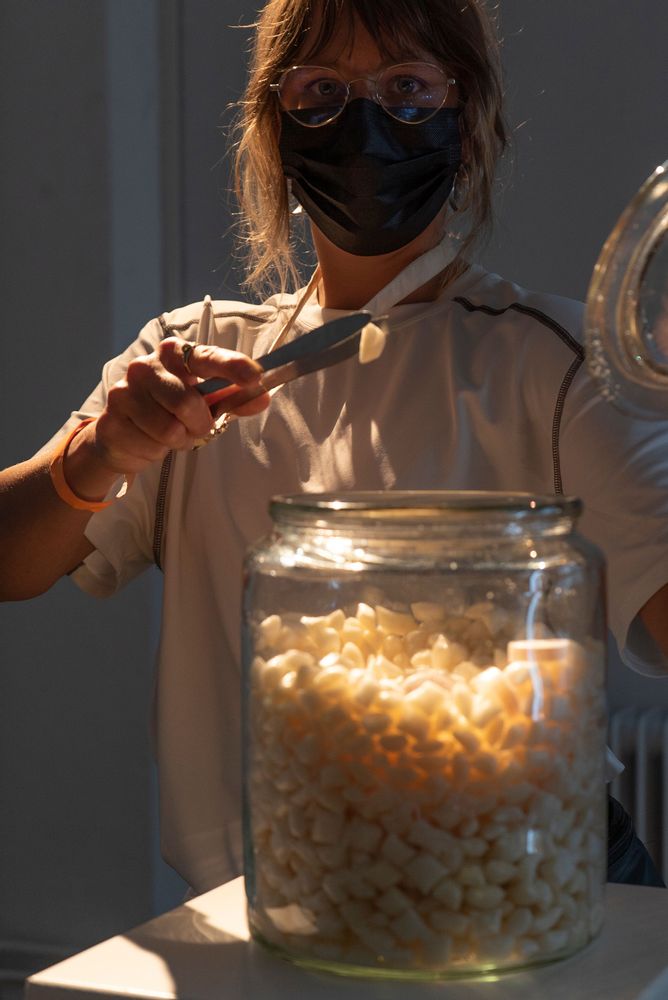
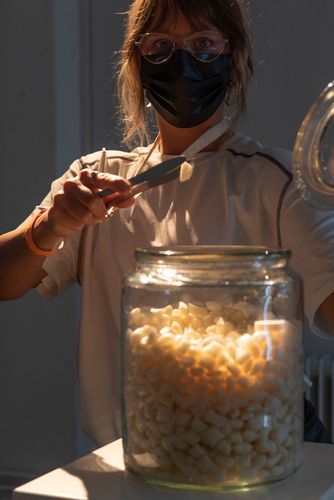
Would you like to try some candy?
Candy jar filled with sweets, multimedia installation, performance: Eszter Forgács, HFBK Hamburg.
https://other-writers.de/2022/03/12/other-artists-clara-alisch/